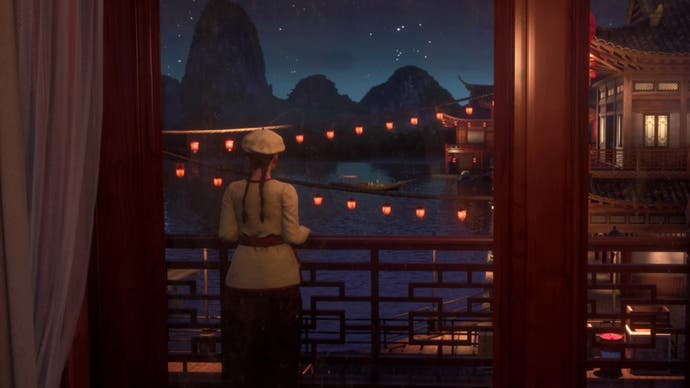The Video Game City Week: Shenmue 3's Hotel Niaowu is a cosy place to spend your time
Welcome to room 201.
Hello! Welcome back to the Video Game City Week. In this piece, Aamir makes the case for including Shenmue 3's wonderful Hotel Niaowu in our ultimate video game metropolis.
Hotel Niaowu
My parents used to take me on various holidays when I was a child. The hotels we stayed in were odd — simultaneously cosy and alien, a place to rest and eat with family while also encountering a swarm of strangers in a far too polished environment. I don’t think I’ve come across a hotel in a game that captures this cosy yet alien sensation quite as well as Shenmue 3’s Hotel Niaowu. The interior of Hotel Niaowu feels as perfectly tidy and elegant as the hotels I recall in reality, with its golden chandeliers and maroon leather sofas. The receptionist, on the other hand, is eccentric and oddly casual, throwing your room keys down on the table in front of her before humming and attending to the curlers in her hair. If you pay more money she also allows the character you play, Ryo Hazuki, to use the lobby telephone, where you can actually call some of the people you knew from the previous games, such as Ryo’s mother-like figure Ine-san, or his close friend Nozomi. You feel, as you talk to them, like smiling, the way you would smile when speaking to an important person after a long time.
.jpg?width=690&quality=75&format=jpg&auto=webp)
Ryo is given room 201, while his traveling companion Shenhua is given the one next door. You climb the steps, passing vases full of flowers, and open your room to find a comfortable area with a small plate full of complimentary apples and a chair with Ryo’s black and green backpack on it. (Oddly, a sofa on the side looks far more comfortable than the bed.) What always catches my eye, though, are the sliding glass doors directly opposite the entrance; the curtains are pulled back and you can see red lanterns strung high up outside and the city harbour beneath, with a boat out on the water. On some nights you enter your room and you see Shenhua standing out there on the balcony, leaning on the railing and looking out at the dark sky. Ryo can slide back the wonderfully dusty and marked glass doors and step out next to her, where they will quietly chat before she departs for her own room to read or sleep.

I’ve always enjoyed visiting inns and hotels in games, such as in the Final Fantasy series, but mostly those moments are very quick, where you go there to replenish your health and then exit. I believe that the reason Hotel Niaowu is so memorable to me is, along with the sense of realism, the time you spend there absorbing all the details around you; the Cheshire Cat grin of the receptionist when you pay your fee, the way you wake up in the morning and come down the stairs, knowing Shenhua will be sitting in the lobby (indeed, you can see her from the upper floor before you even descend), or the friendly stranger you end up chatting to in the dining area. It feels comfortable and safe in the hotel, even if the streets outside can be dangerous. As polished as your surroundings are, there is an undeniable warmth of the kind that Yu Suzuki, the creator of the series, is so good at conjuring. If Shenmue ever gets another game, I’ll miss that hotel, and that strange happiness I feel just seeing a dusty glass door.

